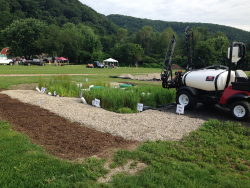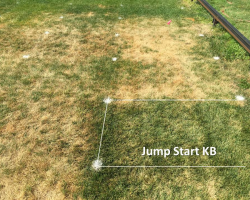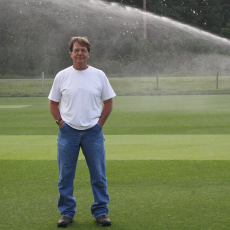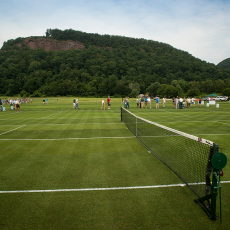At UMass’s Joseph Troll Turf Research Center in South Deerfield, the researchers are doing some of the worrying for you.
When most people drive by the Research Center, what they see is a lush green lawn. What they may not realize is that these 20 green acres are home to an extensive field of research that many of us benefit from without even knowing it. The primary focus of UMass research at the Research Center is the conservation and protection of one of our most precious natural resources: water. Results of turf studies performed on-site inform municipalities, conservation commissions, parks and recreation departments and other entities tasked with understanding environmental impacts. Professors Michelle DaCosta and Scott Ebdon, of UMass’s Stockbridge School of Agriculture perform research to identify grasses that can be used with less water, as well as those that can recover quickly from droughts.
One of the top performing turfgrasses can be seen in the top photograph, compared to all the drought-stressed cultivars surrounding it (this study has been going for two years). A new project funded by the National Turfgrass Evaluation Program (NTEP) and United States Golf Association (USGA) will help to identify the grasses that are the most water-use efficient and that also require less inputs. DaCosta said, “By mixing the different top grass cultivars and species that we have screened under environmental conditions typical of Massachusetts and New England, we can reduce overall inputs of things like water, fertilizers and pesticides in our managed landscapes. This is great information for park directors, homeowners and landscapers, directors of athletic fields and golf courses.”
 In another project, Mickey Spokas, researcher at Stockbridge, is investigating how to minimize movement of fertilizers and pesticides on golf courses, funded by the New England Regional Turf Foundation. This photo shows the constructed wetland at the Troll Center, which includes a wash pad to clean off equipment like mowers and sprayers. The goal is to improve water quality by using plant species that have been shown to take up certain compounds including nutrients and pesticides. After the water moves through the small wetland system it will be 'cleaner' coming out, allowing it to be reused for irrigation or safely released back into the environment. The use of these small constructed wetlands may also have applicability outside of golf courses, where they may be used as a sustainable technology for improving water quality in urban landscapes.
In another project, Mickey Spokas, researcher at Stockbridge, is investigating how to minimize movement of fertilizers and pesticides on golf courses, funded by the New England Regional Turf Foundation. This photo shows the constructed wetland at the Troll Center, which includes a wash pad to clean off equipment like mowers and sprayers. The goal is to improve water quality by using plant species that have been shown to take up certain compounds including nutrients and pesticides. After the water moves through the small wetland system it will be 'cleaner' coming out, allowing it to be reused for irrigation or safely released back into the environment. The use of these small constructed wetlands may also have applicability outside of golf courses, where they may be used as a sustainable technology for improving water quality in urban landscapes.
The Center’s superintendent, James Poro, describes activity this summer as, “very, very busy.” This summer an unusual amount of equipment, new high tunnels, a greenhouse, and swaths of brown-tilled earth were visible at this normally immaculate location. Professor Ebdon explained, “Every three to five years new studies are re-established for research purposes. This is the right time. We plant new varieties of grass and perform different trials.”
Ebdon is enthusiastic about several new studies underway, including assessing how different turfgrasses perform under the simulation of athletic events. A special machine is used to simulate turf wear with athletic shoes, ultimately revealing the most durable type of grass for athletic fields. Maintaining grass cover under intense field use is one of the most important factors associated with reducing player injuries, an important consideration for natural grass fields hosting youth to professional players.
A separate section of the Troll Research Center focuses on a unique research project—grass tennis courts. The University of Massachusetts is the only university research facilities in the United States that conducts trials for grass courts. Three official size single-courts were established and each court is planted with eight different grass species to determine which grass will best tolerate the foot traffic while at the same time using less water for irrigation. Full testing will be conducted in 2017 with the hope of having actual match play on these research plots. Two of the most well-known grass courts in the U.S. will be looking closely at the results: The Tennis Hall of Fame in Newport, Rhode Island and Longwood Cricket Club in Boston. The Directors of Grounds at both of these prominent facilities are graduates of the University of Massachusetts Amherst Turfgrass Science and Management Program.
Once you understand the work at the Troll Center, the UMass Extension Turf Program’s mission is completely clear: to develop, research, gather, and share knowledge on safe, efficient, economically viable and environmentally-sound turf management with emphasis on natural resource protection.
Information on ways to help grass recover from summer drought heat


